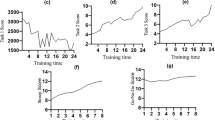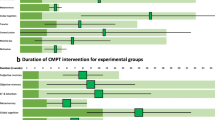Abstract
Background and aims: Cognitive training programs have been developed for Alzheimer’s disease patients and the health]; elderly) population. Collective cognitive stimulation programs have been shown to be efficient for subjects with memory complaint. The aim of this study was to evaluate the benefit of such cognitive programs in populations with Mild Cognitive Impairment (MCI). Methods: Twelve patients with MCI and twelve cognitively normal elders were administered a cognitive stimulation program. Cognitive performance (Logical Memory, Word paired associative learning task, Trail Making Test, verbal fluency test) were collected before and after the intervention. A gain score [(post-score — pre-score)/pre-score] was calculated for each variable and compared between groups. Results: The analysis revealed a larger intervention size effect in MCI than in normal elders’ performances on the associative learning task (immediate recall: p<0.05, delayed recall: p<0.01). The intervention was more beneficial in improving associative memory abilities in MCI than in normal subjects. At the end of the intervention, the MCI group had lower results than the normal group only for the delayed recall of Logical Memory. Conclusions: Although further studies are needed for more details on the impact of cognitive stimulation programs on MCI patients, this intervention is effective in compensating associative memory difficulties of these patients. Among non-pharmacological interventions, cognitive stimulation therapy is a repeatable and inexpensive collective method that can easily be provided to various populations with the aim of slowing down the rate of decline in elderly persons with cognitive impairment.
Similar content being viewed by others
References
Winblad B, Palmer K, Kivipelto M, et al. Mild cognitive impairment — beyond controversies, towards a consensus: report of an international working group on Mild Cognitive Impairment. J Intern Med 2004; 256: 240–6.
Chong MS, Sahadevan S. Preclinical Alzheimer’s disease: diagnosis and prediction of progression. Lancet Neurol 2005; 4: 576–9.
Feldman HH, Jacova C. Mild cognitive impairment. Am J Geriatr Psychiatry 2005; 13: 645–55.
Manly JJ, Bell-McGinty S, Tang MX, Schupf N, Stern Y, Mayeux R. Implementing diagnostic criteria and estimating frequency of mild cognitive impairment in an urban community. Arch Neurol 2005; 62: 1739–46.
Nordlund A, Rolstad S, Hellström P, Sjögren M, Hansen S, Wallin A. The Goteborg MCI study: mild cognitive impairment is a heterogeneous condition. J Neurol Neurosurg Psychiatry 2005; 76: 1485–90.
Geslani DM, Tierney MC, Herrmann N., Szalai JP. Mild cognitive impairment: an operational definition and its conversion rate to Alzheimer’s disease. Dement Geriatr Cogn Disord 2005; 19: 383–9.
Amieva H, Letenneur L, Dartigues JF, et al. Annual rate and predictors of conversion to dementia in subjects presenting mild cognitive impairment criteria defined according to a population-based study. Dement Geriatr Cogn Disord 2004; 18: 87–93.
Luis CA, Loewenstein DA, Acevedo A, Barker WW, Duara R. Mild cognitive impairment. Directions for future research. Neurology 2003; 61: 438–44.
De Rotrou J, Wenisch E, Chausson C, Dray F, Faucounau V, Rigaud AS. Accidental MCI in healthy subjects: a prospective longitudinal study. Eur J Neurol 2005; 12: 879–85.
Larrieu S, Letenneur L, Orgogozo JM, et al. Incidence and outcome of mild cognitive impairment: a population-based prospective cohort. Neurology 2002; 59: 1594–9.
Kirshner HS. Mild cognitive impairment: to treat or not to treat. Curr Neurol Neurosci Rep 2005; 5: 455–7.
Scherder EJ, Van Paasschen J, Deijen JB, et al. Physical activity and executive functions in the elderly with mild cognitive impairment. Aging Ment Health 2005; 9: 272–80.
Rapp S, Brenes G, Marsh AP. Memory enhancement training for older adults with mild cognitive impairment: a preliminary study. Aging Ment Health 2002; 6: 5–11.
Ball K. Effects of cognitive training interventions with older adults: a randomised controlled trial. JAMA 2002; 288: 2271–80.
Yesavage JA, Sheikh JI, Friedman L, Tanke E. Learning mnemonics: roles of aging and subtle cognitive impairment. Psychol Aging 1990; 5: 133–7.
Orrell M, Spector A, Thorgrimsen L, Woods B. A pilot study examining the effectiveness of Maintenance Cognitive Stimulation Therapy (MCST) for people with dementia. Int J Geriatr Psychiatry 2005; 20: 446–51.
Spector A, Thorgrimsen L, Woods B, et al. Efficacy of en evidence-based cognitive stimulation therapy programme for people with dementia: randomised controlled trial. Br J Psychiatry 2003; 183: 248–54.
Davis RN, Massman PJ, Doody RS. Cognitive intervention in Alzheimer’s disease: a randomised placebo-controlled study. Alzheimer Dis Assoc Disord 2001; 15: 1–9.
Breuil V, De Rotrou J, Forette F, Tortrat D, Ganansia-Ganem A, Frambourt A. Cognitive stimulation of patients with dementia: preliminary results. Intern J Geriatr Psychiatry 1994; 9: 211–7.
Olazarán J, Muñiz R, Reisberg B, et al. Benefits of cognitive-motor intervention in MCI and mild to moderate Alzheimer disease. Neurology 2004; 63: 2348–53.
Wilson RS, Mendes de Leon CF, Barnes LL, et al. Participation in cognitively stimulating activities and risk of incident Alzheimer’s disease. JAMA 2002; 287: 742–48.
De Rotrou J, Forette F, Tortrat D, et al. Cognitive efficiency profile, description and validation in patients with Alzheimer’s disease. Int J Geriatr Psychiatry 1991; 6: 501–9.
Petersen RC, Doody R, Kurz A, et al. Current concepts in mild cognitive impairment. Arch Neurol 2001; 58: 1985–92.
Wechsler D. Wechsler Memory Scale — Revised Third Edition: manual. New York: The Psychological Corporation, 1997. Version française, 2001, Editions du Centre de Psychologie Appliquée, Paris.
Reitan R. Validity of the Trail Making Test as an indicator of organic brain damage. Percept Mot Skills 1958; 8: 271–6.
Cardebat D. Evocation lexicale formelle et sémantique chez des sujets normaux. Performances et dynamique de production en fonction de l’âge, du sexe et du niveau d’étude. Acta Neurol Belg 1990; 90: 207–17.
Goldberg D, Bridges K, Duncan-Jones P, Grayson D. Detecting anxiety and depression in general medical settings. BMJ 1988; 297: 897–9.
De Jager C, Blackwell AD, Budge MM, Sahakian BJ. Predicting cognitive decline in healthy older adults. Am J Geriatr Psychiatry 2005; 13: 735–40.
Collie A, Myers C, Schnirman G, Wood S, Maruff P. Selectivelyimpaired associative learning in older people with cognitive decline. J Cogn Neurosci 2002; 14: 488–92.
Femandez-Ballesteros R, Zamarron MD, Tarraga L. Learning potential: a new method for assessing cognitive impairment. Int Psychogeriatr 2005; 17: 119–28.
Stern Y, Albert S, Tang MX, Tsai WY. Rate of memory decline in AD is related to education and occupation: cognitive reserve? Neurology 1999; 53: 1942–7.
Le Carret N, Lafont S, Mayo W, Fabrigoule C. The effect of education on cognitive performances and its implication for the constitution of the cognitive reserve. Dev Neuropsychol 2003; 23: 317–37.
Scarmeas N, Stern Y. Cognitive reserve: implications for diagnosis and prevention of Alzheimer’s disease. Curr Neurol Neurosci Rep 2004; 4: 374–80.
Le Carret N, Auriacombe S, Letenneur L, Bergua V, Dartigues JF, Fabrigoule C. Influence of education on the pattern of cognitive deterioration in AD patients: the cognitive reserve hypothesis. Brain Cogn 2005; 57: 120–6.
Sanchez JL, Rodriguez M, Carro J. Influence of cognitive reserve on neuropsychologic functioning in Alzheimer’s disease type sporadic in subjects of Spanish nationality. NeuropsychiatryNeuropsychol Behav Neurol 2002; 15: 113–22.
Author information
Authors and Affiliations
Corresponding author
Additional information
The present results were presented on a poster: “Wenisch E, Cantegreil-Kallen I, Giovannacci S, De Rotrou J, Moulin F, Batouche F, Rigaud A.S. (2005). Benefits of a cognitive stimulation program for subjects with Mild Cognitive Impairment.” 18th Congress of the International Association of Gerontology. June 26–30, Rio de Janeiro, Brazil.
Rights and permissions
About this article
Cite this article
Wenisch, E., Cantegreil-Kallen, I., De Rotrou, J. et al. Cognitive stimulation intervention for elders with mild cognitive impairment compared with normal aged subjects: preliminary results. Aging Clin Exp Res 19, 316–322 (2007). https://doi.org/10.1007/BF03324708
Received:
Accepted:
Published:
Issue Date:
DOI: https://doi.org/10.1007/BF03324708




